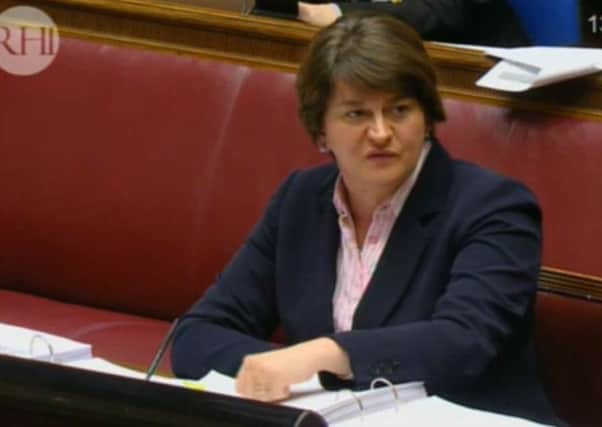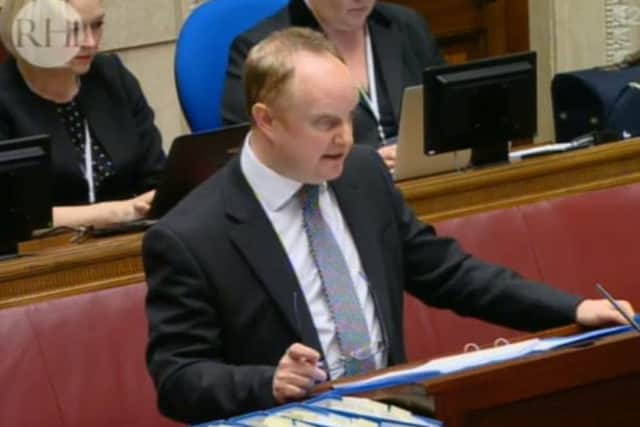Foster asked: Was your department dysfunctional?


In her second day of evidence to the inquiry, the DUP leader was categorical that she did not read the Renewable Heat Incentive Scheme Regulations when she brought them to the Assembly in 2012 and asked MLAs to vote them into law.
The former first minister faced intense questioning from inquiry chairman Sir Patrick Coghlin who asked Mrs Foster – who was in the Department of Enterprise, Trade and Investment for seven years – whether her department had been “dysfunctional”.
Advertisement
Hide AdAdvertisement
Hide AdMrs Foster, who the previous day had told the inquiry that there were no mistakes for which she felt personal responsibility, did not explicitly deny that the department had been dysfunctional but said that her understanding at the time was very different to what she now knows.


The revelation that she had not read the legislation emerged during exchanges about one of several deficiencies in the regulations whereby they did not adequately define ‘useful heat’ which would be eligible for subsidies, making it more difficult to crack down on potentially fraudulent claims.
Mrs Foster said that she “imagined it would have been defined in the legislation”.
When asked if she had at any stage read the regulations, Mrs Foster said: “No. No, I didn’t. So there’s...absolutely not. I didn’t read the regulations.”
Advertisement
Hide AdAdvertisement
Hide AdDavid Scoffield QC for the inquiry asked Mrs Foster if she would have read the regulations when she brought them to the Assembly for approval.


She said: “No, I don’t believe I would have read them at that stage. I probably would have only read the explanatory note, but not the regulations involved.”
Later, Sir Patrick picked up on what Mrs Foster had said. Referring to the failure to conduct planned reviews of the scheme, which may have caught its perverse incentive to waste heat, he said that “a fail-safe way of doing it would have been, or could have been, to incorporate regular reviews in the regulations...but then you didn’t read the regulations.”
From page one
Mrs Foster’s failure to read the regulations contrasts sharply with how she presented them to the Assembly at the time. In October 2012, as she asked MLAs to vote for the regulations, she took personal credit for the work, saying: “This demonstrates my commitment to the sector and my desire to see levels of renewable heating increase.”
Advertisement
Hide AdAdvertisement
Hide AdMrs Foster told MLAs – who subsequently passed the legislation unanimously after only a few minutes of debate – that the regulations “are set in a very clear framework for the scheme, including how payments will be calculated and made, as well as its conditions and eligibility standards”.
The significance of the absence of records of key meetings or decisions about the RHI scheme became starkly apparent yesterday.
Mrs Foster’s repeatedly used phrases such as “I don’t remember”, “I can’t recall” and “I don’t think I have any clear recollection” about key meetings which were unminuted.
Sir Patrick drew attention to the contradictory claims of civil servants – many of whom have been clear there was a culture of not minuting many meetings – and that of Mrs Foster and her Spad, who say that they thought that minutes were being taken.
Advertisement
Hide AdAdvertisement
Hide AdSir Patrick said: “You do wonder what is going on within this department”.
Mrs Foster insisted that she always believed minutes were being taken but that they never came to her for ratification.
During probing questioning, Sir Patrick put it to Mrs Foster: “Can we just stand back for a moment and look at the system here?
“You’re head of this department and Fiona Hepper is the head of energy and Dr Crawford is your special adviser. And you’re being asked to deal with a completely novel form of incentivised project in a market which nobody knows how it will respond; volatilitty, unpredictability is written all over it.
Advertisement
Hide AdAdvertisement
Hide Ad“We know, or we appear to know...that the two people who you trusted, Dr Crawford and Fiona Hepper...Dr Crawford doesn’t read any of the financial appraisal reports of which there are two full reports and an addendum, despite the public having paid money for those reports. He doesn’t read any of those – and yet he is your trusted special adviser.
“Fiona Hepper does a submission which at a minimum is a bit difficult to understand and – perhaps understandably again – a meeting is organised.
“There is clear guidance that where a meeting is to take place that involves additional information ...and indeed as a general proposition, meetings about submissions should be recorded and the guidance clearly says that the meeting should be recorded by the department making the presentation to the meeting.
“Now, there are no notes or records about this.
“Does that not start to edge towards a dysfunctional department, if these are the two people that you trusted and one of them didn’t read any of the detailed appraisal documentation, the other one comes to you with an explanation that involves additional information but no notes are made of it, no enquiry is made as to whether notes are being made and yet this is a unique project?”
Advertisement
Hide AdAdvertisement
Hide AdMrs Foster said she was “somewhat taken aback that there were no notes of the meeting. I would have expected notes to have been, if not taken at the meeting, at least after the meeting that there would have been some sort of record of what I had said at the meeting, of what she had explained to me.
Sir Patrick said: “Absolutely. Neither you, nor Dr Crawford, thought it appropriate to ask Fiona to produce notes.”
Mrs Foster said: “But that would not have been the normal practice. I would have expected notes to have been taken.”
Sir Patrick said: “Yes, you would. And if notes hadn’t been forthcoming, either you or Dr Crawford might have thought as a common sense [reaction] ‘we’ve just been told more information; this submission has now been explained in a very different way. Could you give us the note please of what was said?’”
Advertisement
Hide AdAdvertisement
Hide AdMrs Foster said: “All I can say is that I would have expected notes to be taken. I wouldn’t in the normal course have seen a copy of the note of a meeting; it wouldn’t have come back to me. I would have expected that to have been put...into the file...I didn’t see it as my role to check if a minute was put somewhere of the meeting... it wasn’t my normal practice to do that because I would have assumed...”
Sir Patrick interjected: “Right, let’s accept that it wasn’t your normal practice. What seems to me to be incontrovertible is that your expectations of the two trusted people were completely unfulfilled.”
Mrs Foster said: “Well, that’s something that you have to...”
Sir Patrick said: “Well, if you can correct that, please do so.”
Advertisement
Hide AdAdvertisement
Hide AdMrs Foster said: “Well, in terms of Andrew, he was a Spad and I suppose the question is: What does ‘special’ mean in terms of adviser...I think it was the fact that he was a political appointee, yes, but also in his case because he has a doctorate in agriculture he does have a specialism in that direction.”
Mrs Foster’s former Spad, Andrew Crawford, will return to give evidence on Monday and Tuesday of next week, followed by Mrs Foster continuing her evidence on Wednesday and Thursday.
She will also return for further hearings in the autumn.